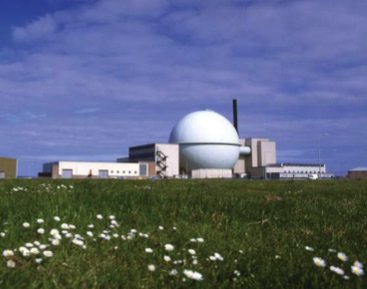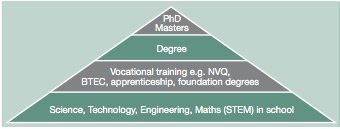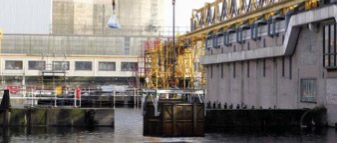Nuclear reactors for the production of energy (electricity) were first used in the mid-1950s. In 2005 the Nuclear Decommissioning Authority (NDA) was set up by the UK government to clear and decontaminate the UK’s civil public sector nuclear sites. NDA is a non-departmental public body formed by the Energy Act 2004. The NDA has its head office in West Cumbria and a network of four offices across the UK.

NDA oversees the decommissioning of nuclear power stations and waste materials. Management of the nuclear sites is contracted out to seven different operators known as Site Licence Companies (SLCs). These SLCs directly manage the clean-up of the 19 public sector nuclear sites across the UK.
The NDA has an annual budget of around £2.2 billion. This comes from the government and NDA’s commercial assets. Much of this budget is spent on specialist sub-contractors who clear the sites and remove waste. However, a significant part of the budget over £280 million – is spent on skills support, research and development and employee benefits such as pensions.
NDA’s mission is to ‘deliver safe, sustainable and publicly acceptable solutions to the challenge of nuclear clean-up and waste management.’ To achieve its mission, NDA must ensure the availability of a skilled workforce for nuclear decommissioning and clean-up. This workforce will be able to:
- ensure the highest standards are set for safety, security and environmental management
- create an efficient first-rate industry
- increase value for money and effectively employ resources
- efficiently and effectively eliminate site hazards and develop waste solutions
- win the agreement and support of all stakeholders, e.g. contractors, government, local communities, the public, trade unions and employees.

NDA directly employs around 200 people. Although many roles are focused on science and engineering, NDA also needs people who are qualified in other areas. These are as wide-ranging as project and contract administration, health and safety, communications, finance, legal, human resources and administration.
This case study shows how NDA has put in place a training and development strategy to ensure it has the best people to help deliver its mission.
Human Resources strategy
An organisation depends on its employees to deliver its objectives. The Human Resources (HR) department manages and develops an organisation’s workers.
HR departments carry out workforce planning. This involves assessing the workforce needs of an organisation in terms of the numbers of workers and the skills and capabilities required. Employers consider their future workforce needs to allow them to plan recruitment and training activities. The HR function therefore has a strategic role to play in the achievement of business aims and objectives.
Training needs analysis
As part of its workforce planning for the whole decommissioning industry, NDA undertook a training needs analysis. Skills shortages were identified in a number of areas including:
- cost and project control engineers
- quantity surveyors
- environmental specialists
- project managers
- radiological protection advisors.
Skills gaps
In order to provide safe and sustainable nuclear clean-up and waste management solutions, the industry must have highly skilled workers. In addition to the shortages identified, NDA has experienced a number of other challenges in the skills area. These include the ageing workforce within the industry. As workers retire, their skills will be lost.
Another challenge is the low uptake by students of STEM subjects (Science, Technology, Engineering and Maths). To address these challenges NDA has developed the National Nuclear Skills and Capability Strategy. The aim of the strategy is to ensure that NDA has measures in place to meet the demands of the industry. It also aims to raise its profile as an employer of choice for existing and future employees.
Skills and Capability Action Plan
The Skills and Capability Action Plan details the actions required to achieve objectives. This relates to both NDA and to the Site Licence Companies within its control. Historically, SLCs were responsible for developing their own people although this work was funded centrally by NDA.

NDA wanted to put in place a strategy that would give both it and the SLCs more benefit in terms of sharing best practice, greater efficiency, value for money and a more standardised approach to training and development. In developing the strategy, six key themes have emerged which inform the activities and investments that are made by NDA, its partners and its stakeholders.
NDA’s rationale for investing and developing its own workforce and that of the SLCs and their sub-contractors is to:
- deliver safe, effective and efficient performance
- establish a clear understanding of skills and behavioural requirements
- focus on developing flexible skills
- ensure the correct level of suitably qualified personnel
- meet changing requirements
- provide a well-educated, informed and enthusiastic workforce.
The strategic role of training and development

To secure training and skills for the future, NDA must start in the classroom. It then follows the journey of potential and current employees on to college, university and post-graduate research. Its Skills and Capability Strategy directly relates to its People strategy, focusing on developing employees to deliver and sustain world-class skills. It also offers career pathways to meet future needs.

NDA’s People strategy is based around the Skills Pyramid. This is recognised across many industries. The pyramid shape indicates the quantity of demand for workers at different levels of skills.
Training and development initiatives
Different initiatives have been developed by NDA to ensure that there is adequate support to develop people for the industry at all four levels. Its programmes include:
- the Energy Foresight programme this engages GCSE science students with interactive teaching materials
- The Times 100 business case studies – NDA supports the provision of business educational materials for schools and colleges
- industry-specific NVQs NDA has joined with partners to establish accreditation for NVQs and the 14-19 Diploma within the industry. It supports its supply chain partners through initiatives like the NVQ level 2 in Nuclear Technology Decommissioning
- Lancaster University MSc specifically designed courses for the decommissioning industry
- NDA has joined forces with Manchester University’s Dalton Nuclear Institute to provide a world-class nuclear research, teaching and education facility for staff and postgraduate students
- Energus a jointly funded initiative producing a world-class centre for skill-based learning and business support. This is geared to improve skills in the local workforce
- development with the National Skills Academy for Nuclear (NSAN) of a nuclear skills passport. This will ensure qualifications and experience are recognised across the industry and increase workforce flexibility, mobility and career chances.
There are costs (both of money and staff time) associated with training and development. However, these costs need to be put into context against the risk of not having a highly-trained and skilled workforce in the nuclear industry in future years.
Training
Training is the acquisition of knowledge and skills to enable a person to carry out a specific task or job. Training benefits employees in several ways:
- It increases their sense of ownership in the business and encourages motivation.
- Staff become more organised, productive and flexible and therefore better able to meet the needs of internal and external customers.
- New skills and abilities in areas such as decision-making can empower staff, which makes them more effective.
The Nuclear Decommissioning Authority offers training in the form of induction, on-the-job and off-the-job training.
Induction
Induction training takes place for new employees. It helps them understand the workplace and how they fit into it. Examples of skills and knowledge required by a new employee may involve work rules, benefits or health and safety. These help them to carry out their jobs safely and efficiently. As part of the Energy Act 2004, NDA implemented induction training for new staff, alongside its programme of stakeholder engagement.
On-the-job
On-the-job training takes place at the workplace and is related to specific job roles. Basic training may be given by a member of the team already doing the job. The benefits of on-the-job training are that it is usually cost-effective and directly relevant to the employee’s role.

Every employee develops a Personal Development Plan (PDP) that sets clear objectives. These relate not just to the individual’s job, but also to the overall objectives the NDA sets with government for the whole organisation. PDPs have targets and ‘stretch’ targets. Achieving these has a direct impact on the amount of annual performance bonus an individual might receive. In this way, every employee understands how his or her job fits into the ‘big picture’ and has clear incentives to work to deliver results.
Off-the-job
Some training may be off-the-job. This is undertaken away from the workplace by professional trainers. It may be provided by another organisation, a college or a university. For example, the National Skills Academy for Nuclear is part of Cogent, the relevant Sector Skills Council for the nuclear industry.
It works alongside NDA to provide careers advice and guidance on career progression, jobs and training. It covers aspects such as:
- career pathways
- up-skilling – i.e.focusing on addressing skills gaps by providing nuclear standards and qualifications. These include NVQs in Radiological Protection (Levels 2, 3 and 4) and Nuclear Decommissioning (Levels 2 and 3)
- industry passports – used for nuclear site induction training and maintaining a record of achievements.
Some training programmes such as apprenticeships, combine both on-the-job and off-the-job training.
Entry routes
NDA provides entry into the company in different ways. Apprenticeships are offered through SLCs linking directly with local colleges, as well as through the NSAN linking with local sub-contractors and the NDA itself. These routes provide the opportunity of taking NVQs.
NDA’s nuclear graduates programme offers a unique path to a long term career in the nuclear industry. This is supported by 20 of the UK”s leading businesses, including Rolls Royce, Toshiba and BAE Systems. This route provides support over two years, with three secondments, 300 hours of dedicated training and two dedicated mentors.
Development at NDA
Development is about helping workers develop and broaden their capabilities to assist their career progress. It helps to increase levels of employee motivation and produce long-lasting competencies. This means that employees become more positive, productive and valuable to the organisation in the long term. Motivation theorists suggest that if workers are allowed to grow and extend their abilities, they will take greater responsibility. This will make them more effective in their work.
NDA supports talent development by investing in employees and by creating great teams. A comprehensive learning and development package is provided at individual, team and organisation level to meet the needs of the business. Individuals take many different development paths, depending on their abilities and qualifications.
Champions
As part of their development, nuclear graduates also act as ‘champions’ for the industry. For example, to help others learn more about what working in the nuclear industry is like, graduates contribute blog entries to the Nuclear Graduates Footprints website.

Graduates may have a first degree in any subject. For instance, Michael has a degree inEnglish Literature.
‘My first placement was at the NDA headquarters in Cumbria. Three weeks of team building exercises including kayaking and trekking provided an introduction to the industry! I started working in the Communications Directorate helping with the marketing of the graduate scheme.
I am currently on my second secondment for the Nuclear Industry Association based in London and I’m working in communications again as a lobbyist. This means providing information to government and the industry ready for the nuclear new build and giving briefings to reporters on what is happening in the nuclear sector. You need to be innovative and dedicated because the sector is so complicated and you need to keep up-to-date with what is going on. I am pleased to be part of changing the perception of the nuclear industry in the UK. The NDA scheme offered something more: one of its best selling points was that it gives you lots of opportunities and challenges.’
Craig holds a degree in Mechanical, Chemical and Process Engineering.
‘I work in a team of engineers and managers from different backgrounds and we are solely responsible for improving and maintaining plant operations. I like the opportunity to solve problems and the technical area of work. I see many different stages of a project, from procurement through to design.
The nuclear graduates programme has provided me with an opportunity to undertake various training courses to expand my knowledge and improve my understanding of safety and other areas related to my profession. The industry is lacking some key engineering expertise in terms of numbers so the opportunities for graduates now and in the near future are wide, varied and exciting.’
Conclusion

The NDA recognises it has a key role to play in leading the development of world-class nuclear skills. Training and developing its people helps it to fulfil its mission and operate to the highest standards.
Effective training and development helps employees to reach their full potential whilst providing the organisation with the skills and capabilities it needs for the long term.

‘I firmly believe that through this commitment to a shared Strategy, with effective partnerships developing the initiatives and infrastructure required, we will create a world-class workforce that will deliver the NDA mission to the benefit of all. Together we have the opportunity to make a positive difference and develop a skills heritage that we can be proud of both now and in the future.’
